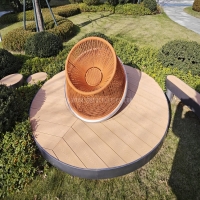Welcome to the website for landscape facilities products and knowledge.
How does the design of a landscape bar counter influence its ability to resist damage from falling debris?
The integration of a bar counter into landscape architecture requires meticulous design consideration to withstand environmental challenges, particularly falling debris from weather events or overhead structures. A well-engineered landscape bar counter employs several strategic design elements to mitigate impact damage.
Material selection forms the primary defense mechanism. Commercial-grade granite, poured concrete, or reinforced polymer composites offer inherent resistance to impact forces. These materials distribute kinetic energy from falling branches, hail, or occasional dropped items across a wider surface area, preventing localized fractures. The material thickness—typically exceeding 4cm for outdoor applications—further enhances structural integrity.
Structural design plays an equally critical role. Counters with reinforced internal steel frameworks or fiberglass mesh embedding demonstrate significantly higher impact tolerance than monolithic designs. The incorporation of slight slopes (1-2 degree pitch) on horizontal surfaces encourages debris roll-off rather than accumulation, reducing prolonged stress points. Overhanging eaves or integrated cantilever designs provide physical barriers against debris falling from adjacent structures or trees.
Surface treatments contribute substantially to damage resistance. Textured finishes—such as flamed granite or bush-hammered concrete—disguise minor impacts while creating micro-fracture patterns that prevent crack propagation. Non-porous sealants prevent water infiltration into micro-fractures, eliminating freeze-thaw damage expansion in colder climates.
The substructure design determines overall stability. Deep-foundation supports (minimum 30cm depth for freestanding bars) prevent settling that creates vulnerable stress points. For wall-attached designs, stainless steel cantilever brackets spaced at 60cm intervals provide uniform load distribution against impact forces.
Maintenance accessibility features indirectly influence damage resistance. Removable access panels facilitate inspection of internal supports, while strategically placed expansion joints allow natural material movement without compromising structural continuity during impacts.
Through these integrated design approaches, landscape bar counters achieve exceptional durability against falling debris while maintaining aesthetic harmony with their natural surroundings. The most successful designs balance material robustness with proactive defensive features, creating functional outdoor entertainment spaces that endure through seasonal challenges.
Related search:

Recommendation
Swivel chair-Specialty steel structure woven rattan leisure chair with rotatable design